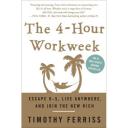The title of the book was very appealing; it’s been in the top 20 list for a while. I read this book while on vacation for three weeks while traveling in Taiwan. The message strikes a chord. At first, the author sounds like a spoiled brat advocating people to become the new rich (NR), re-thinking what you’re doing and to use the time to travel around the world. I am still skeptical but I did learn a few things from the book about re-thinking what I’m doing day in and day out and perhaps apply some of his elimination/automation techniques to free up some time to re-align my own career and to achieve to the best of my capability. I’m not sure I want to pack up my bag and start “vagabonding” but I certainly should slip in more vacation time to “see” the world.
The author offers the DEAL method: D (definition), E (Elimination), A (Automation) and L (Liberation).
For the “Definition,” the author threw away the standard time management techniques and went into something more fundamental on why we even spent the time to do the tasks. Some of the suggestions are standard: like 80/20 rules, Parkinson Law (tasks are expanded to fill the time: keep a time limit on any task, especially delegated tasks), and batching (group all similar tasks together for higher efficiency). But the other suggestions are a little uncommon, like “do not multi-task” (not efficient), “selective ignorance” (this may sound irresponsible and is sure less stressful) , “non-finishing” (don’t feel obligate to finish things if it doesn’t serve your goal), “selective meetings” (keep the sharp focus of meetings to reach agreement, anything else can be done on emails. Use the “puppy-dog close” (reversible) to get away with anything).
In the Elimination category, the author offers ways to delegate tasks to “virtual assistants” taking advantage of the global outsources from India and China. Evidently, there are quite a few things you can offload to the your virtual assistants like shopping for gifts, basic researches and etc. When working with your delegates, use the “criticism sandwich” – sandwich the criticism between complements.
On Automation, the author offers a few ideas on how to put on income autopilot. 1) Pick a niche market, 2) Brainstorm product ideas (able to put benefits in one sentence, costs $50~$200, takes 3~4 weeks to manufacture, explain in FAQ’s, 3) Resell, license or create. He suggests one becomes an expert in order to sell ideas by 1) joining trade org, 2) read 2 ~3 top allies boards, 3) give free seminar, 4) write article and join profnet.
Of course, the hardest part is to come up with some profitable ideas that meet the above criteria. Putting them in autopilot should be easier once the market has been identified.
On Liberation, the author debates about the meanings of life, which I wholeheartedly agree, i.e. to love, to be loved and continued learning. He also offers ideas how to maximize your dollars while traveling.
Overall, the income ideas seems interesting and plausible. I’ll probably give it a try. But my main take aways are around the “elimination” and delegation of tasks. Reading this book while vacationing for 3 weeks in Taiwan really gives me different perspectives. It allows me to step back and see how deep I have been in this rat race. Shouldn’t we all step out once in while and smell flower and see all the beauty in the world? After all, we only get to live once. It would be so good to travel, explore and soak in all the cultures. I probably cannot handle the lifestyle of vagabonding but doing this once a while is rather refreshing.

